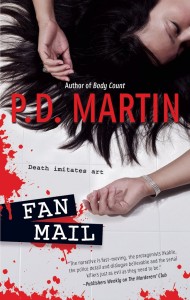
By P.D. Martin
Today TKZ is thrilled to have a tremendous writer from the land down under join us, author PD Martin. In her latest release, Fan Mail, Aussie FBI profiler Sophie Anderson is working a case where fiction has become fatal. A popular crime writer is murdered and posed just like the crime scene in the dead author’s last book.
Could crime fiction incite someone to kill? This is a question I’m often asked, and it’s one of the themes I explore in my third book, Fan Mail.
Having done lots of research on murder and criminal psychology, my belief is that if someone is going to take another human being’s life, reading fictional accounts of murder is not going to push them over the edge. Having said that, we do live in a world where we’re increasingly exposed to violence and graphic crime-scene depictions.
Take the many successful (and entertaining) shows on TV: CSI, Bones, Law & Order: SVU…and then, of course, there’s Dexter. But have we really been desensitized?
A few years ago, after lots of meticulous research into horrific and violent crimes, I honestly believed I was desensitized, almost in a similar way to a cop. I’d imagined some horrible situations and written about them in detail. I was tough!
Or so I thought, until I met Victoria Police’s profiler, who gave me a list of law-enforcement text books to help with my research. I ordered them online and was so excited when they arrived; and the timing couldn’t have been better because I was packing for a week-long writing retreat. I threw the books in my luggage and headed down to the beach.
The first thing I did when I arrived was to unpack the books and start flipping through one…and then I saw it. The first page the book opened to was a photo from a crime-scene in which a woman had been raped then murdered. The killer had tied her down and posed her in a disturbingly revealing way. Next photo: a dead woman with both of her breasts cut off. Next p hoto: a decomposing body. Next photo…I think you get the picture. In that instant I realised my so-called desensitization wasn’t real. They say a picture tells a thousand words and in the case of crime-scene photographs, it’s certainly true. The new set of books disturbed me, but they also made me understand my character, Aussie FBI profiler Sophie Anderson, so much more intensely – to be faced with these photos every day and go on….it’s definitely one of the hardest jobs in the world.
hoto: a decomposing body. Next photo…I think you get the picture. In that instant I realised my so-called desensitization wasn’t real. They say a picture tells a thousand words and in the case of crime-scene photographs, it’s certainly true. The new set of books disturbed me, but they also made me understand my character, Aussie FBI profiler Sophie Anderson, so much more intensely – to be faced with these photos every day and go on….it’s definitely one of the hardest jobs in the world.
I’m thankful that I write fiction because I can make stuff up and no matter how graphic and horrific, I know it’s not real. And this is also a large part of why I don’t think crime fiction can, or would, incite someone to kill. It is fiction, and no matter how descriptive or well written we know it’s not real. Law-enforcement text books on the other hand…they could be very scary in the wrong hands.
So I’m curious: what do you think? Could reading crime fiction serve as the catalyst for actual crimes?
PD Martin – Phillipa Deanne Martin – is an Australian author with a background in psychology. She has written four novels featuring Aussie FBI profiler Sophie Anderson, of which the first three are currently available in North America – Body Count, The Murderers’ Club and Fan Mail. See www.pdmartin.com.au for more information.

I think the most likely way crime fiction could “inspire” a real crime is to give a criminal who is already thinking of committing a crime an idea of how to get away with it. A unique angle on a bank robbery, for example, or ways to handle a blackmail payment. Possibly a body disposal method. I also think anyone who committed such a crime, then “blamed” it on the book or movie was likely to have committed that crime, or something similar, anyway.
Hi – welcome back to TKZ! I hope no one gets inspired by crime fiction and I agree with Dana. I think only those who are already thinking of it would find a peverse way to use a book as inspiration. Still true life is stranger than fiction so who knows. Scary! Good luck with Fan Mail – I can’t wait to read it!
Thanks for contributing to TKZ, P.D. I think that once our words, whether fiction or true crime, are published, we have no control over their impact on the reader. I would hope that no one takes inspiration from any author’s work and uses it to commit a crime. But that doesn’t change the fact that our job is to write the best book we can. Good luck with FAN MAIL.
Pornography has been demonstrated to incite copy cat behaviours. Photography of graphic violence may likewise incite physical acts of violence. Textual illustrations however, especially in fiction, do not seem to hold the same sway over readers.
I believe this is due to the fact that viewers of images or videos of graphic sex or violence are not fully aware of the process leading up to and following acts of violence. They only see the end product, or the middle sequence of the action. They also do not see the ramifications for the perpetrator. Therefore curosity gets the best of them and with no clear penalty in their perspective, they act.
Readers of violent fiction though almost always see the build up, are shown the villain in a negative light, and see that in spite of short term victories the serial killer/rapist/terrorist/thug almost always loses in the end and usually dies trying. Therefore the reader has seen the end state to be less than desirable and will seldom act.
Therefore when it comes to thrillers & crime fiction we can rest somewhat secure in that we are not likely encouraging violence.
What we end up doing to our own psyche on the other hand may be something different altogether.
…I know I’ve scared the willies out of myself more than once when writing violent scenes.
I think it’s violent people who are spurred by images, and even without the visual stimulation provided by porn or murder, they would bridge the gap themselves.
I have several police homicide handbooks and they are very disturbing. A friend of mine who is head of a major state CSI lab says he can’t believe people can watch CSI, but that is because he sees real crime scenes and finds it disturbing that the subject is something a viewer would think was entertaining.
Thanks for stopping by, PD!
Interesting question. I know that many serial killers read crime fiction and textbooks on police procedure as a way of refining their techniques and avoiding capture, so it’s certainly outside the realm of possibility. But do the books have a causal effect if you weren’t already predisposed to violence? I doubt it. For most people, I believe these stories actually are cathartic.
Interesting comments! Yes, I think people who are going to kill, or capable of it, don’t “need” crime fiction for inspiration.
And yes, John, those crime-scene handbooks are certainly disturbing. Like you, I’ve got a friend (ex-cop, not CSI lab) and he can’t understand why everyone’s so obsessed with crime shows and crime novels. But it’s not reality for readers/viewers, whereas it is for law enforcement.
And thanks for having me at TKZ!